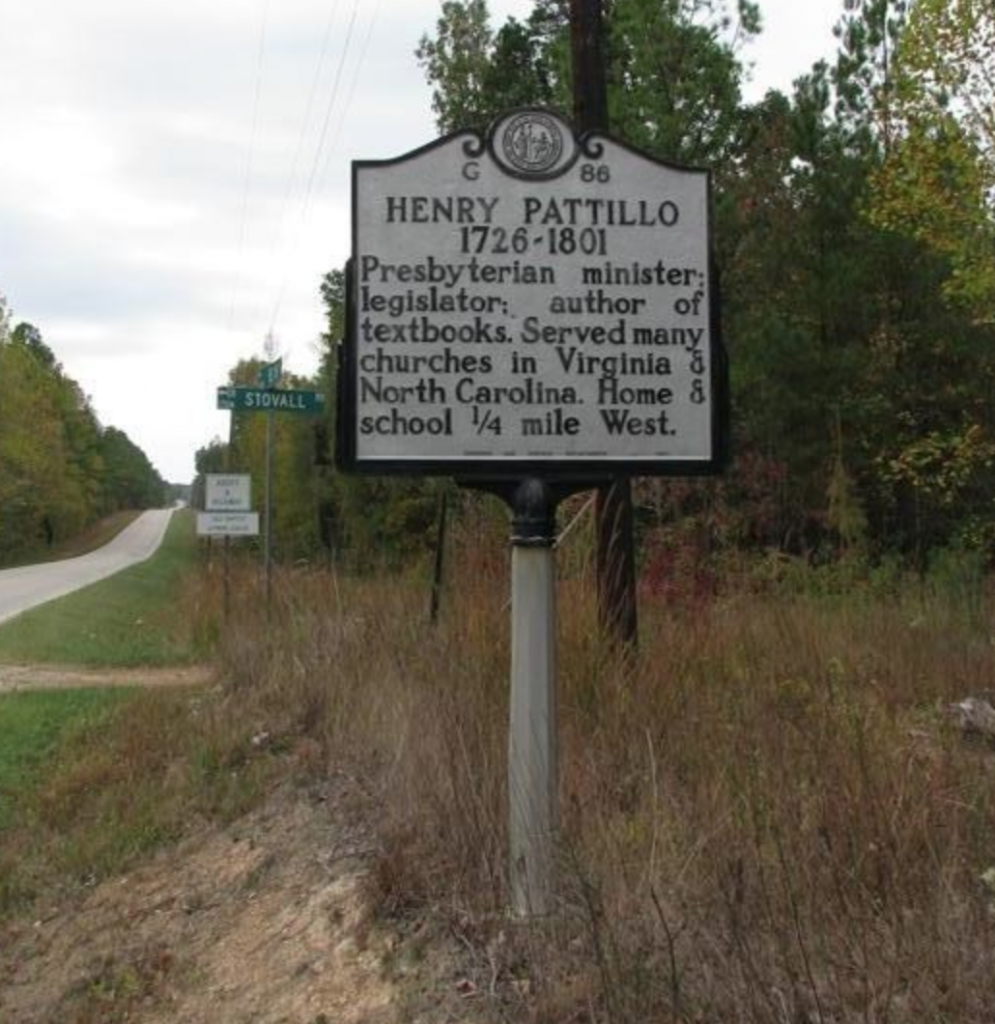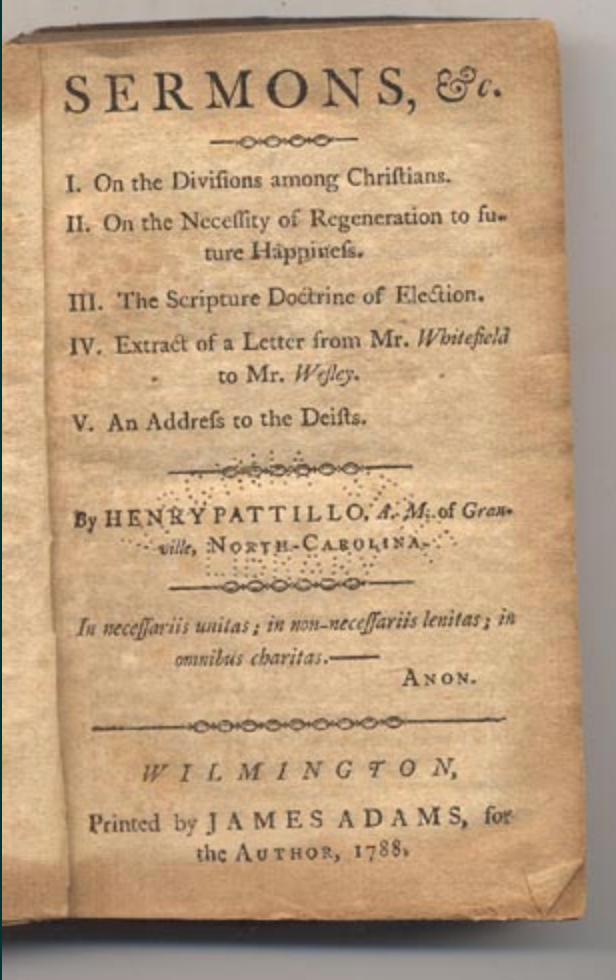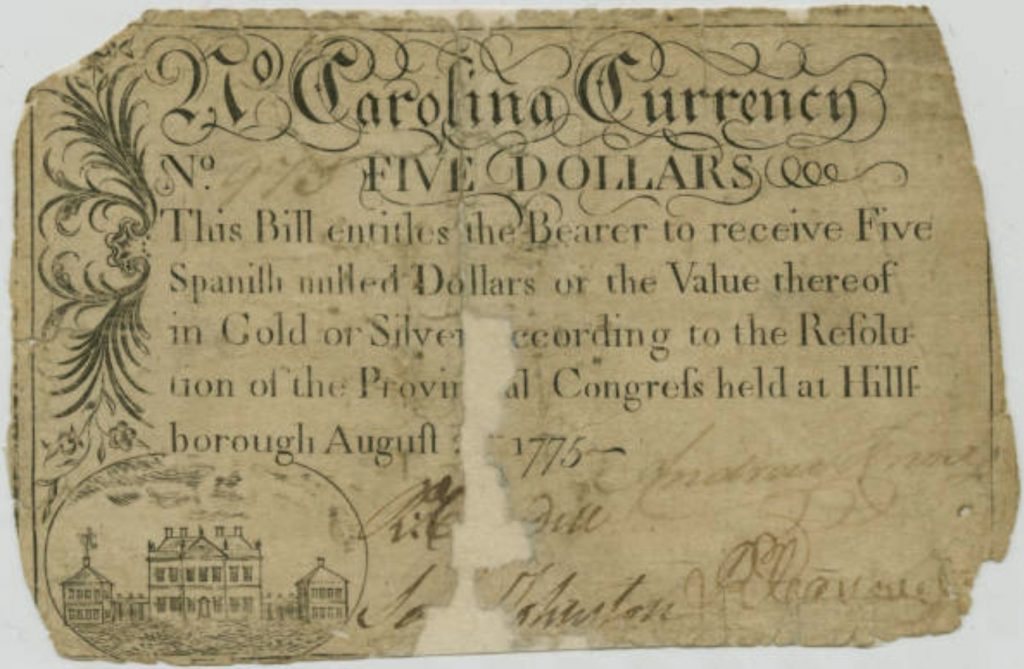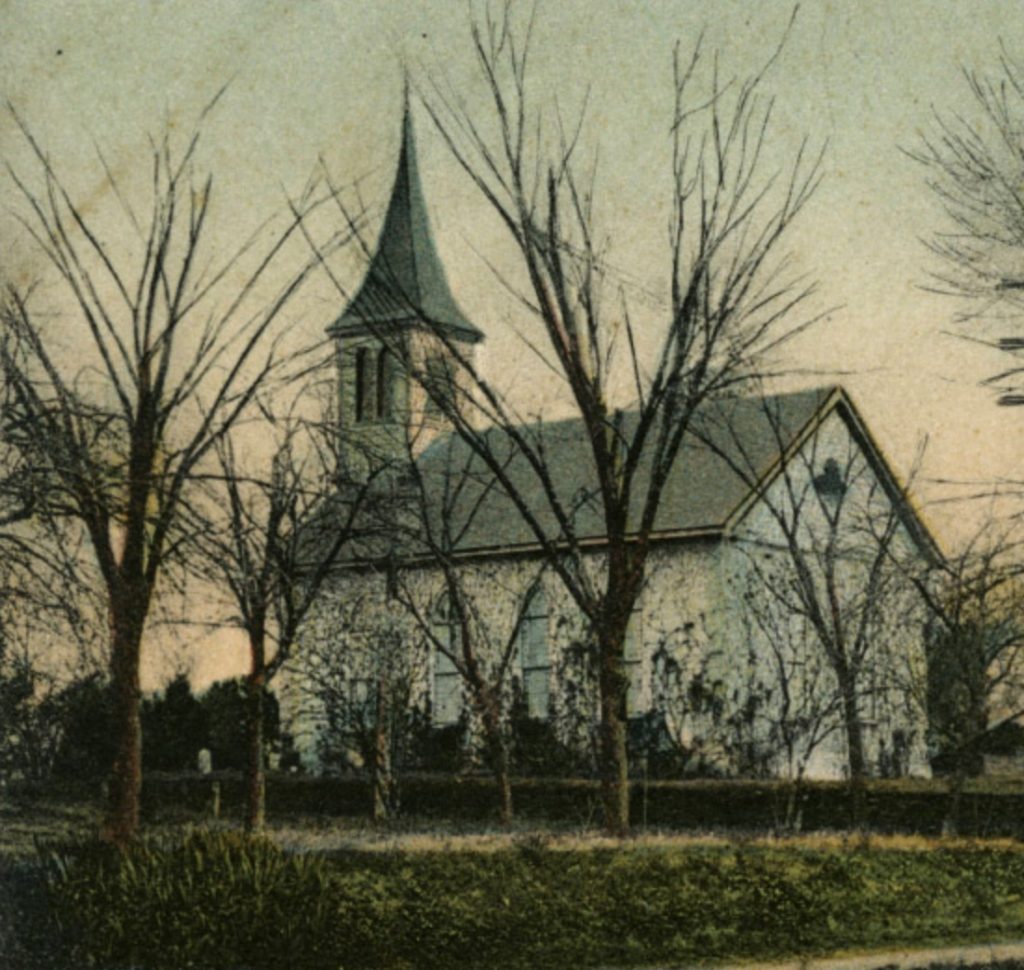"It is impossible to rightly govern a nation without God and the Bible." ---George Washington
Rev. Henry Pattilo
Born: 1726 Scotland Died: 1801 Granville Co., No Carolina


Brief Description and Synopsis of Henry Pattillo
He was elected a county delegate to represent Bute County in the Third Provincial Congress, which met August 20, 1775 at Hillsborough and made chaplain of the group. These congresses created a governmental structure issued bills of credit to pay for the movement, and organized an army for defense, in preparation for the State of North Carolina.
From the minutes recored of the Third Provincial Congress of North Carolina it states, “Resolved, that the Revd Mr. Henry Patillo be desired to read prayers to the Congress every morning, and the Revd Mr Charles Edward Taylor every evening, during their stay here.”
He published a book of his sermons (1788), which included homilies entitled “The Divisions Among Us” and “An Address to the Deists,” as well as A Geogrpahical Catechism (1796), a textbook on geography written in question-and -answer style, the first publication of its kind in North Carolina.

Reverend Henry Pattillo – Revolutionary War Patriot
Delegate to the Third Provincial Congress of North Carolina 1726-1801
Henry Pattillo, an influential pioneer minister of the Presbyterian Church and educator, was born in Scotland in 1726 and immigrated around the age of 14 to Virginia about 1740 with his brother George. The brothers settled in Virginia because they had relatives living there. All that is known about his life in Scotland is that his rearing was described as “of pious parents, who were well situated in the point of religious privileges.” In his own words “ he was a child of “religious parents, educated with care and tenderness above many mine Equals: and that in the Middle of Scotland.” Henry found employment in a mercantile establishment. His duties were, “to learn the establishment of the counting house. ”But as a youth he became disappointed with his occupation and felt “in his absence from religious instructions and restraints, the overcoming power of temptation” for a time prevailed over him from what he had been taught. He knew he needed to leave and do something different because of the temptations. Henry loved books and learning he started working as a schoolteacher for a time but still felt like something was missing in his life. He described his thoughts in his Journal and bore his testimony:
Here, by what means I cannot tell, it being so gradual, I got such astonishing views of the method of salvation, and of the glorious Mediator; such sweetness in the duties of religion; such a love to the ways of God; such an entire resignation to and acquiescence in the divine will; such a sincere desire to see men religious, and endeavor to make those so with whom I conversed…. I must, to the eternal praise of boundless free grace, esteem it a work of the Holy Spirit, and the finger of God.9
In his journal he records that he prayed out loud many times a day and loved to talk with other’s about Christianity. While working as a schoolteacher, Pattillo yearned to join the ministry. In 1750 he was traveling to Pennsylvania to train as a minister and became violently ill in Virginia. He ended up convalescing at the home of Rev. Samuel Davies. Around 1750 he began his studies with Presbyterian educator Samuel Davies. He got married 5 years into his studies against Samuel Davies desires. His wife had some resources of her own that they lived on for a time and Henry continued to teach school to support his family while he studied under Rev. Davies.
They didn’t live a life of luxury. Henry described their house as “a house 16 by 12 and an outside chimney, with an 8 feet shed—a little chimney to it.” On June 13, 1757, the house was struck by lightning. There were no injuries or fatalities even though there was Henry and his wife a child as well as 6 students and a black boy living within. Through personal illness, marriage, and his mentor’s journey to England, Pattillo continued his studies and earned the equivalent of a college education in 1758 to become a Presbyterian Minister. The requirements with which Henry Patillo had to comply in order to become an ordained minster have been quoted in detail in order to emphasize it was not an easy matter to become an approved minister in the Presbyterian church in the eighteenth century.
“The Committee, upon a thorough Consideration of Said Sermon, unanimously approve of it, as a satisfactory Part of Trial. The Committee proceeded to examine Mr. Pattillo upon Ontology, Pneumatics, Ethics, Rhetoric, natural Philosophy, Geography and Astronomy, Latin, Greek, Hebrew Languages, as well as Religious Knowledge; in all which he discovered a very satisfactory Degree of Knowledge. They appointed him to prepare a Lecture on Daniel VII, 19-27, and a Sermon on the 27th verse of said Chapter.
It took him 8 long years to be awarded a ministers license. He was then licensed and ordained in the Presbyterian Church. The distance involved for the ministers to travel to meetings was a real hardship on the North Carolina clergy. There weren’t many ministers so they would travel all over the state to speech.
In 1765 Pattillo accepted a call from three Orange County, North Carolina, congregations and moved to the state that would be his home for the remainder of his life. With education close to his heart, he established a small school in his home, filling the need for such a facility in the frontier community. Pattillo’s residence in Orange County put him among the Regulators, some of whom were likely members of his congregations. (The Regulators were a large group of North Carolina colonists who opposed the taxation and fee system imposed by colonial officials in the late 1760s. The citizens took up arms against colonial officials, whom they viewed as corrupt. Though the rebellion did not change the power structure, some historians consider it a catalyst to the American Revolutionary War. This political argument led to a battle between the colonial militia and the Regulators in 1771.)
Although he and the other Presbyterian ministers in the state supported the goals of the Regulators, they did not agree with their methods. Pattillo and the others, including David Caldwell, wrote two letters to Governor William Tryon and to the churches in their presbytery condemning the unlawful acts. Pattillo, Caldwell, Hugh McAden , Joseph Alexander, Hezekiah Balch, and James Creswell founded the Presbyterian Synod of the Carolinas in 1788, firmly establishing the denomination in the region.
After nine years in Orange County, Pattillo moved in 1774 to Bute County where he again operated a school and became interested in political matters. Henry Pattilo was both a student and teacher all of his life. To him education was only secondary to preaching the Gospel. From his youth he supported himself either wholly or in part by teaching school.
He was elected a county delegate to represent Bute County in the Third Provincial Congress, which met August 20, 1775 at Hillsborough and made chaplain of the group after it convened. From the minutes recorded of the third Provincial Congress of North Carolina it states, “Resolved, That The Revd Mr. Henry Patillo be desired to read prayers to the Congress every morning, and the Revd Mr Charles Edward Taylor every evening, during his stay here.”
Third Provincial Congress —-The third congress met in Hillsborough, from August 20 to September 10, 1775. Its president was Samuel Johnston (Harvey had recently died). This congress, which included representatives of every county and town, officially established itself as the highest governmental body in the province (British Governor Martin had fled, ending royal government).
To govern North Carolina when the congress was not in session, a 13-member Provincial Council, or Council of Safety, was elected, constituting the first executive body in a North Carolina free of British rule. Cornelius Harnett was elected as the first president of the council. The congress divided the state into 6 military districts for purposes of organizing militia and for determining representation on the Council.
He was also assigned to serve on a committee with Richard Caswell and Maurice Moore to explain to the former Regulators that the oath of loyalty Governor Tryon forced them to take under military duress was not morally binding and did not prevent them from joining the Patriots in their struggle for independence of Great Britain. In addition, Pattillo was made a member of the Provincial Council for the Halifax District. In 1771 he had been named a trustee of Queen’s College, and in 1776 he became a trustee of Granville Hall. He also participated in a movement to establish Warrenton Academy.
In 1784 the minister’s Granville parishioners presented him with a 300-acre farm on Spicemarrow Creek on condition that he remain their pastor permanently, and Pattillo lived there with his family until his death.
While engaged in political affairs, the clergyman did not neglect his ministry or his educational projects. In 1787 he published a treatise on Christian conduct entitled The Plain Planter’s Family Assistant; Containing an Address to Husbands and Wives, Children and Servants; With Some Helps for Instruction by Catechisms; and Examples of Devotion for Families: With a Brief Paraphrase on the Lord’s Prayer. In the same year Hampden-Sydney College awarded him an honorary master of arts degree in recognition of his accomplishments. He published a book of his sermons (1788), which included homilies entitled “The Divisions Among Us” and “An Address to the Deists,” as well as A Geographical Catechism (1796), a textbook on geography written in question-and-answer style, the first publication of its kind in North Carolina. After a journey around the world through questions and answers, the book ended with a description of America. The Rev. Patillo said:
“We come in the last place to the freest, happiest, most plentiful part of the globe; and the farthest removed from tyranny…. A country in which religion is unrestrained; morality in repute; education promoted; marriage honourable, and age reverenced.
- 104. Pray, sir, where lies this terrestrial paradise?
- Within the limits of the United States; and the spot you stand on, makes a part of it….”
The second paper he wrote was addressed “To heads of Families” and stated:
A family is a little community within itself, of which smaller communities, states and kingdoms are composed. Out of your families are to arise the future citizens of these States. Cast back your eyes to the American Revolution. Never forget the wonder God hath wrought for your country. The acknowledged independence of America, is an event that engages the eager attention of all Christendom. It has, to a vast extent of continent, secured those civil and religious liberties, which are unknown in any other part of the globe.
One of the sermons in the book was entitled “The Division Among Christians,” and the preacher showed plainly that he was concerned with denominational stress. He wrote:
Had the Christian world in all ages sacrificed a few grains of orthodoxy for charity, it would have been an immense gain by the exchange: for if charity be greater than faith and hope, I would not hesitate to pronounce it greater than orthodoxy…may the day speedily arrive when the greatest contention among Christians shall be, who shall love their Redeemer best, and who shall serve him with the greatest zeal. Amen
Pattillo was able to earn only a simple living during his life, and sometimes barely that. When he lived in Bute County, he was merely listed as a “Taxable,” without any description of his property.
In 1780, by which time he was living in Granville County, Patillo wrote to Charles Pettigrew, “I am extremely frail, and I judge this frame incapable of reparation, until sown a natural & raised a spiritual body. Pattillo’s parishioners in 1784 gave him a 300-acre farm on the condition that he remain permanently as their pastor. During his time in Granville County, Pattillo published a book of his sermons and A Geographical Catechism, a geography text written in question-and-answer format.
Pattillo was forced to a meager existence in his old age. He lost his savings by extending help to his family and very nearly lost everything when his son failed in business.
A close friend underestimated the Christian zeal of the man who had contributed so generously of his strong physique and agile mind to the cause of Carolina Christianity. In his seventy-fifth year the feeble preacher went on an evangelistic mission to Dinwiddie County, Virginia, and died while there in the year 1801.
A description of Pattillo as he was remembered by Mrs. John Holt Rice, who knew him in the prime of life, pictured him as a heavy man with a large frame and coarse features, which were usually lighted with a cheerful smile. He had a loud, commanding voice and his delivery was impressive. He was poor, but not unhappy with his lot, and extremely earnest in his work. Next to his ministry, his great love was books, a natural affinity for a scholar.
Description of Reverend Henry Pattillo by Mrs. John Rice
The Rev. Henry Pattillo is seventy-four years of age. His white, trembling, palsied head is filled with sound and useful knowledge. He appears to be an eminently pious and faithful minister of the gospel; a kind and attentive husband; an affectionate and indulgent father; a cheerful and pleasant companion; and a polite, noble and generous friend. Mrs. Pattillo is an amiable and respectable woman. Long have this unfortunate pair travelled hand in hand the high road to heaven. Often on their way, have they been called to struggle with adversity. A long and tedious distance have they journeyed through the vale of extreme poverty. “Several times have we eaten our last morsel; and where to look for more, but to heaven, we knew not. To heaven we looked; and before we were again hungry, we were furnished with sufficient & comfortable food. It seemed,” continued he, “it truly seemed as tho’ a kind Providence had poured it down from above…. we are now, blessed be God! in comfortable circumstances; and our future earthly wants will be few.”82
More about the Third Provincial Congress—
On September 9th, the Third Provincial Congress authorized the creation of additional Provincial Troops, with a slightly different mission than the first two regiments authorized on September 1st. These additional troops were named Minutemen (or Minute Men), and each new “military district” was authorized to establish one regiment, with Congress providing the commissions of the six regimental officers. The Minutemen were enlisted for six months and were only authorized to serve within the boundaries of North Carolina.
On the same date, Congress authorized each of the thirty-five (35) existing counties to raise their Militia, with the stipulation that all men from the ages of 16 to 60 must serve a minimum of three months on a rotation, essentially only once each year. Regiments were created with the field officers of Colonel, Lt. Colonel, Major, and Adjutant, plus a minimum of ten (10) companies to the led by a Captain, two Lieutenants, one Ensign, two Sergeants, two Corporals, a Drummer, a Fifer, and fifty (50) private soldiers. The Militia regiments were to be mustered at least twice each year, and individucal companies were to be mustered and trained at least once each month.
The first two regiments of Provincial Troops were assigned to the Continental Line in November of 1775. A Colonel of the Continentals ranked above a Colonel in the Minutemen, and a Colonel of the Minutemen ranked above a Colonel in the Militia. But, a Colonel of the Minutemen ranked above a Lt. Colonel of the Continentals, as did a Colonel of the Militia ranked above a Lt. Colonel of the Minutemen.
In the two Continental regiments there were sixty-seven (67) commissioned officers; one hundred and ninety-eight (198) in the Minutemen, and twelve hundred and twenty four (1,224) in the Militia, making an aggregate of fourteen hundred and eighty-nine (1,489) military officers commissioned by the authority of the Provincial Congress at this fairly early stage of the struggle.
The Third Provincial Congress appointed a Committee of Safety to prepare a plan for the regulation of the internal peace, order, and safety of the colony. To this committee was also entrusted the duty of proposing a system of government, the definition of powers, the qualification of all electors, “and every other civil power necessary to be formed in order to relieve the Province in the present unhappy state, to which the administration has reduced it.”
Cornelius Harnett was elected as President of the first Provincial Council, a most arduous and dangerous post to which a citizen could be called, and essentially represented the executive officer of the government, being exposed to all the abuse and insolence of the proclamations of the offshore Royal Governor Josiah Martin.
On August 29th, as the Chairman of the Ways and Means committee, Richard Caswell, submitted a report on the state of the public funds, embracing two points, which will serve to exhibit the resources which were inherited from the Royal government. The first was that there was a large amount of public money in the hands of sundry sheriffs, which had been collected under the late government, and the payment of which he recommended should be immediately enforced. The second point was that considerable sums had been collected by the officers of the late government, which he recommended should be returned to the persons from who they were collected or else allowed in any subsequent payment of taxes.
On September 7th, Richard Caswell reported that it was expedient to issue, on the faith of the Province, a sum not exceeding $125,000, in bills of credit, and with the report submitted the forms of these bills, an example follows:
“North Carolina Currency

“This bill entitles the bearer to receive five Spanish milled dollars, or the value therefof in gold and silver, according to the resolution of the Provincial Congress, held at Hillsborough, August 21st, 1775.”




